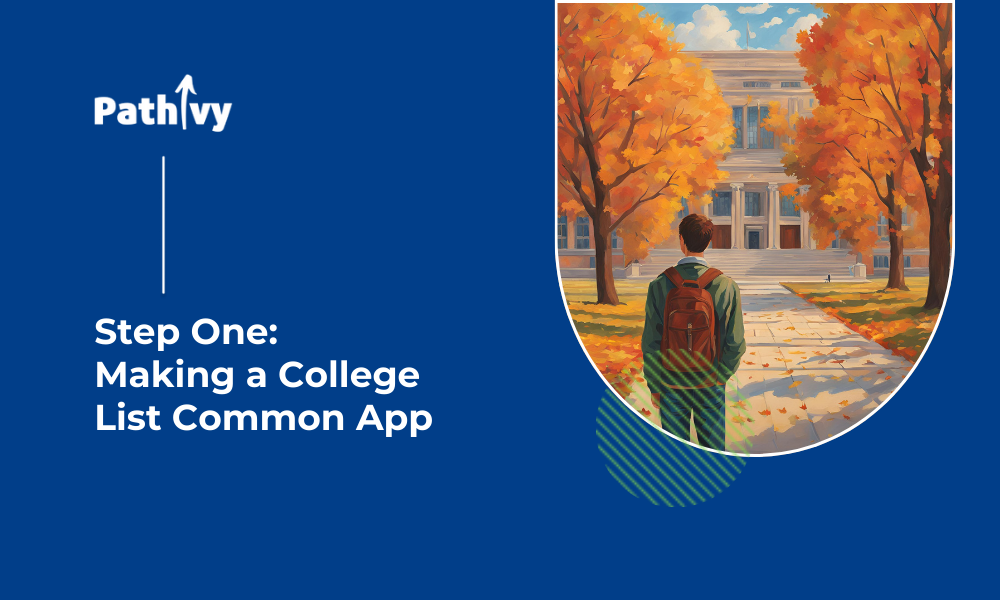Welcome to Step One of our 6-step sequence for Juniors aimed to guide them through the college applications process. Today, we'll be learning about Making a College List Strategically by going over some of the key criteria for college "fit", the three main categories of schools (reach, target, and safety), and discussing some other tips to ensure a strong basis for applications. Look out for next incoming guide on Letters of Recommendation and check out the summary post for more helpful information on how to tailor a strong application plan. Now, back to the main topic, finding the right colleges for you:
Think About Baseline Preferences
There are tons of different factors that might make or break a school for you. Following are a couple of the most important parts to keep in mind:
- Location - Consider the weather and surrounding area of the campus. California weather can be a huge plus for schools like the UCs, but perhaps the urban setting of NYU is more desirable. Try and identify your ideal learning conditions and see how close schools can get to it.
- Programs - This one's a bit of a no-brainer, but make sure to actually check what programs are provided at each institution. Can you follow your passions at each school? Some schools, like Stanford, have good programs overall, best for undecided individuals with multiple passions - while others, like MIT, may be better for a student who only wants to study specific subjects.
- Activities - Does each school have the clubs and activities that you want? Some may have better clubs that are more competitive to get into, while others may be more open to everyone. It's important to look at the things you can do outside of class, because they're what makes the college experience great.
- Athletics - If being able to root for a football team is important to you, make sure to think about that - some schools with great academics may be on the worse end for sports. Others may not offer many recreational sports options, so if those are something that you'd like to do, check each school to make sure you can.
- Culture - Every institution has a certain culture to it. It can be a bit hard to define exactly what a school's culture is, but there are a few things you can look out for - some breed more competitivity, while others focus on cooperation and group success, for example. Try to imagine the overall culture of each campus by looking at how grading works, what traditions are most popular, etc.
- Demographics - Is it important to go to a religious school? Or one with a small or large student body? Is diversity something that you need to have a good college experience? There are a lot of different statistics about the demographics of each school, so try to find ones with the characteristics that work best for you.
- Tuition - Some colleges charge much greater prices for tuition, while others offer amazing financial aid. Even if you get into your top school, if you can't afford it, you won't be able to attend - so make sure to look at tuition and aid plus think of potential plans for loans, if needed.
- Lifestyle Needs - Other things, like having easy access to the gym daily or being able to go to the pool, may be important to your day-to-day life. It's a good idea to double check that you can continue (or perhaps start) a good daily routine with the resources available at whatever schools you're considering applying to.
Do the research and think about the bare minimum of what you could write about on a "Why do you like our college" essay. If a school has so few attractive features that you cannot identify what you'd write about in an essay, it's probably not the best fit.
Make sure to look at a wide range of colleges and start with a big list - narrowing down is generally better than needing to build up. Building a priority list can help eliminate schools that aren't as good of a fit, while also assisting later in figuring out essay schedules. Keep in mind that an oversaturated list will make it harder to dedicate yourself to the schools that matter most. Applying to every school within the Top 20 is unlikely to yield good results, because no application will get the attention it deserves. You might also be out of luck with no target or safety schools, so continue reading to find out about those:
Reach, Target, and Safety Schools

There are three main categories assigned to schools based on your chances of getting in - Reach, Target, and Safety.
- Reach schools are ones that you might be able to get into, but it's very uncertain. All Top 20 schools should be considered reach schools by everyone - even with "perfect" extracurriculars and good essays, their competitive rates and holistic review means that there are no guarantees.
- Target schools are institutions that you should be able to get into, although it isn't guaranteed. These schools are on the middle-to-less competitive sides, where it's likely that you will get in, but not quite inevitable. This may be your state school, depending on your place of residence and individual application.
- Safety schools are schools with admission that is practically guaranteed. This could be a school like Arizona State University (which is actually guaranteed for many applicants). Safety schools are like a safety net to ensure that you have a solid place to go even if all reach and target schools somehow fall through - so don't underestimate the competitiveness of the process and make sure to apply to at least one safety.
It's important to sort schools into these categories and strategically pick a healthy mix of each. Only applying to Reach schools may leave you without any good options, whilst ignoring schools that seem impossibly hard to get into is an unnecessary limiter on your potential. You must define what bucket each school fits into based on your own application, which can be difficult - experienced college counselors can be very helpful for this step. For example, the University of Washington can be a target or safety school for students with strong extracurriculars, a 4.0 unweighted GPA, and top test scores, while being a reach school for others. This also depends on the competitiveness of the major they are applying for. Following are two fake student profiles to illustrate this:
Note that UW's average unweighted GPA is 3.75, and average ACT is 27-33.
- Student One has a 3.9 unweighted GPA, got a 35 on the ACT, has some focused extracurriculars and properly planned essays, and is interested in Psychology. The University of Washington would likely be a Target or Safety school for this student, as their application is overall above the average that is admitted. However, if they were applying for the Computer Science major, it would likely be a reach due to the competitiveness of UW's Computer Science program.
- Student Two has a 3.4 unweighted GPA, got a 25 on the ACT, did an alright job with extracurriculars and essays, and is interested in Linguistics. Given their overall stats are underneath the averages for UW, it should be considered a reach school, because admission is uncertain.
Researching the average admissions data can be helpful to separate some schools out, but remember that top end schools begin to rely heavily on holistic review and essays. Having the same average test score and GPA as the average Yale admit is a great achievement, but it does not say much about your chances on its own. Be cautious with the analysis you do when you're figuring out which of the three categories each school falls into.
Other Considerations
- It's easy to get caught up in the concept of a "dream" college, but try not to fall prey to it too hard - its fine to have one, but don't trick yourself into thinking that only one school can be a fit for you. Make sure to stay open to new choices. Sometimes, research can make different schools feel far more inviting. There should be many schools that fit you, and many schools that do not.
- "Fit" is important for you to find colleges to apply to, but it's also something that admissions officers keep in mind when they read your application. Colleges want to admit students with the vibe they want their school to have. Chances are, if you can't imagine yourself enjoying life at a certain institution, they won't be able to imagine that either - so applying to random schools just for the chance of admission isn't super worth it compared to really perfecting the applications for your top choices.
- Visiting schools can be a great way to learn more about the campus and the vibe, but remember that it isn't everything. Having bad weather for a tour or some similar misfortune can make visits lopsided in places they shouldn't be - so try and stay cognizant of this and do not put too much weight on the few hours you get to be at a school. It's highly recommended to take notes for later usage in essays and to have an easier time recollecting information when making decisions. Pictures are very helpful too!
- Colleges will market themselves in a way to attract the students they want, so looking at admissions pages, emails, etc. can be another good way to define your "fit" at a school. Some institutions, like Swarthmore, are famous for having relatively unique marketing platforms - keep in mind that they might go purposefully overboard to make a point, but that the underlying vibe is part of the attitude they have towards their own school.
Final Thoughts
It can be stressful to think about so many factors when deciding on a college list, but remember that you can change things as you write essays! It's important to have a solid list, but it isn't mandatory for it to be perfect - your opinion of schools will change as you write essays, get results back, etc. Try not to stress too much about having the optimal college list, as long as there's enough representation for you to have options across the board.
Remember to check our summary post for more information on the 6 Steps to Successful Applications and stick around to learn more about Letters of Recommendation! Figuring out your "fit" can be hard, but the more you pretend to wear the T-shirt of different colleges and "try on" their vibes, the closer you will be to finding the perfect match. Best of luck!
Sign up for a free 30-minute consultation today!
Written by DB, PathIvy Content Team
.png?width=175&height=73&name=ORIGINAL%20LOGO%20Blue%20and%20Green%20(1).png)
.png?width=50&name=author-image%20(2).png)

